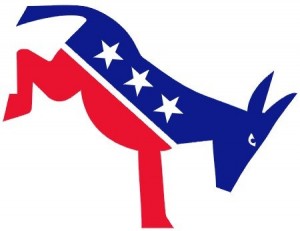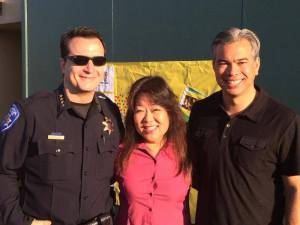
Battle for AD 15 and CD 15 Democratic endorsement moves to the State Convention
Feb 8 Update
Congress: In CD 13, Barbara Leee was recommended for endorsement, with 100% of the vote. I was wrong about CD 15, and Eric Swalwell got the majority of the vote, though not enough to get a recommendation. The fight for the endorsement goes up to the Convention, where it will probably come to the floor, giving Ellen Corbett an advantage. Stay tuned. As predicted, in CD 17 Mike Honda easily got the endorsement. Indeed, Ro Khanna did not even bother to show up to the meeting, probably thinking that his time was better spent campaigning.
Senate: Mary Hayashi did show up and made some vague accusations against Bob Wieckowski, but couldn’t get even one vote. Wieckowski easily got the recommendation for the endorsement for SD 10, with a handful of votes going to Roman Reed.
Assembly: I was surprised to see that a clear majority of the votes in AD 15 went to Elizabeth Echols, though not enough to break the 70% and give her the recommendation. The endorsement thus goes to the Convention. As predicted, Andy Katz got a few votes, but none went to either Sam Kang nor Pamela Price-Crawley. Both civil rights lawyers were pretty impressive, however, and I’m interested in hearing more from both of them. Tony Thurmond‘s vote count may not have impressed, but he’s a dynamic and inspiring speaker and made an impression even with my very politically jaded 12-year-old. While Echols is likely to win at the endorsement caucus at the convention, if Thurmond can pull her name out of consent – which he may very well be able to – and send this to the floor of the convention, he has a very good chance of winning. Echols may be solid, but she’s not an exciting candidate.
Also as predicted, Rob Bonta and Bill Quirk easily got the endorsements for AD 18 and AD 20 respectively. No endorsement recommendation was made for AD 25, and nobody got enough votes for this to go up to the convention. Craig Steckler got the most votes, but Kansen Chu wasn’t far behind, with Teresa Cox trailing both. Armando Gomez didn’t get any votes. While Steckler called himself a progressive Democrat, almost all his campaign loot comes from police chiefs and law enforcement, which suggests he isn’t going to Sacramento to fight for civil liberties and against the prison-industrial complex. Mik
—–
The California Democratic Party will be conducting pre-endorsement conferences throughout the state this weekend. Members of the Democratic State Central Committee (DSCC) and other eligible Democrats will meet to listen to the different candidates that are competing for the Party’s endorsement in their respective districts and will vote on whom should get it. In races where a Democrat is endorsed by the party, other Democrats are encouraged to drop out.
Most of Alameda County, including San Leandro, falls within the Party’s region 5, and the caucus for our region will take place on Saturday, Feb. 8, starting at 2 PM at the Laborers Local 34 hall, located at 29475 Mission Blvd in Hayward. Any Democrat is welcome to attend.
While the vote count happens after the candidates have an opportunity to speak, in reality most candidates have been going around picking up vote-by-mail ballots from their supporters. Candidates who get 70% of the vote at the pre-endorsement conference are placed in the consent calendar for Party’s endorsement at the State Party Convention which will take place in early March – though their endorsement can be challenged with signatures of either 20% of DSCC members in their district or statewide. If no candidate gets 70% of the vote, but at least one gets 50%, there will be an endorsement caucus at the Convention, where they will need to garner 50% or 60% of the vote (depending on incumbency status), to get on consent. The same will happen if an endorsement is challenged.
In order to qualify for the Democratic endorsement, a candidate must be a registered Democrat and pay a fee ranging from $250 to $500.
Here are the candidates who are vying for the Democratic endorsement in Region 5
Congressional District 13
The only candidate running for the endorsement is incumbent Barbara Lee, who will easily get it.
Congressional District 15
Incumbent congressman Eric Swalwell battles State Senator Ellen Corbett for the endorsement. My bet is that if any candidate gets the endorsement tomorrow, it’ll be Corbett. I also bet that if one of them gets it, the other will have the endorsement challenged and it will go the Convention.
Congressional District 17
Here, congressman Mike Honda holds a significant advantage over challenger Ro Khanna. Khanna ran a successful slate at last year’s delegate elections and he may have a few other votes, but they will likely not be enough to prevent Honda from getting the endorsement. They may be enough for a challenge, but Honda is sure to get the endorsement at the Convention. Linguist Philip Bralich is also running for the endorsement, but I don’t believe he’ll get even one vote.
Assembly District 15
There are no incumbents in this race, but there are five candidate vying for the endorsement. Preliminary endorsements suggest that the two actual contenders are Alameda County Democratic Central Committee member Elizabeth Echols and former Richmond City Councilmember Tony Thurmond. EBMUD Director Andy Katz may get a few votes, but it seems unlikely that either civil rights attorneys Sam Kang or Pamela Price-Crawley will get any. The latter doesn’t even have a campaign website. My guess is that at least one of the candidates will get 50% of the vote, and the endorsement for this race will go to the Convention.
Assembly Districts 18 and 20
The only candidate running for AD 18 is incumbent Rob Bonta and for AD 20 is incumbent Bill Quirk, so both have it in the bag.
Assembly District 25
Four Democrats are vying for the open seat being left by Bob Wieckowski. San Jose Councilmember Kansen Chu battles Ohlone Community College Board Trustee Teresa Cox, Milpitas Councilmember Armando Gomez and former Fremont Police Chief Craig Steckler. I know nothing about the voters in that race, but given the crowded field it seems unlikely that anyone will get the endorsement tomorrow or even send this to the Convention.
Senate District 10
This is the race that actually makes me want to go to the conference (I already sent out my ballot). Assemblymember Bob Wieckowski is running against former Assemblymember and convicted thief Mary Hayashi. Also in the race is stem-cell-research-activist Roman Reed. Hayashi hasn’t even bothered to set up a campaign site, and she hasn’t done any fundraising lately (though she does have a lot of money from previous races she can use), but she did apply for the Democratic endorsement, so she’s presumably running. It’s unlikely she’ll get any endorsements votes, however. Reed may get a few, but Wieckowski should easily get the endorsement and keep it on consent.
I’ll post results tomorrow.
 Once again, it’s time for the election for delegates to represent AD 18 (San Leandro, Alameda and most of Oakland) to the California Democratic Party’s State Central Committee. State delegates get to vote on the party’s endorsement of Democratic candidates for state and national office, on the state party’s platform and on regional and state party officers. If we want to have a state party that is open to regular Democrats and that puts civil rights and social justice before the interests of the party machine, we need to elect delegates that represent those values.
Once again, it’s time for the election for delegates to represent AD 18 (San Leandro, Alameda and most of Oakland) to the California Democratic Party’s State Central Committee. State delegates get to vote on the party’s endorsement of Democratic candidates for state and national office, on the state party’s platform and on regional and state party officers. If we want to have a state party that is open to regular Democrats and that puts civil rights and social justice before the interests of the party machine, we need to elect delegates that represent those values.

 Our state officials seem to be working as hard as they can to help the NSA track the movement of US citizens as much as possible. Their latest stunt?
Our state officials seem to be working as hard as they can to help the NSA track the movement of US citizens as much as possible. Their latest stunt?